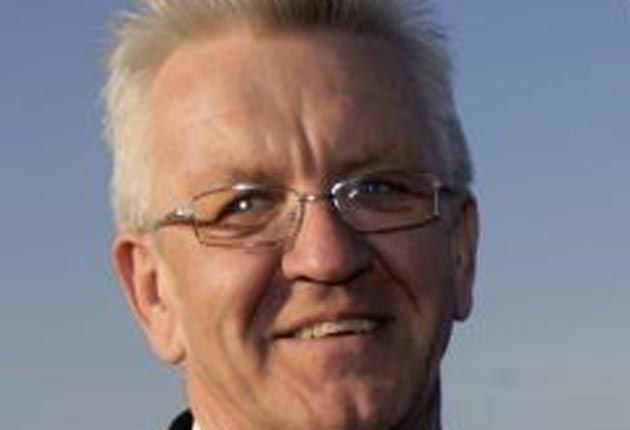'Moses' set to exploit atomic angst to defeat Merkel in elections

Your support helps us to tell the story
From reproductive rights to climate change to Big Tech, The Independent is on the ground when the story is developing. Whether it's investigating the financials of Elon Musk's pro-Trump PAC or producing our latest documentary, 'The A Word', which shines a light on the American women fighting for reproductive rights, we know how important it is to parse out the facts from the messaging.
At such a critical moment in US history, we need reporters on the ground. Your donation allows us to keep sending journalists to speak to both sides of the story.
The Independent is trusted by Americans across the entire political spectrum. And unlike many other quality news outlets, we choose not to lock Americans out of our reporting and analysis with paywalls. We believe quality journalism should be available to everyone, paid for by those who can afford it.
Your support makes all the difference.It felt like an action replay of Germany's 1980s anti-nuclear protests: balloons emblazoned with the famous "laughing sun" symbol floated above longish-haired heads while laidback bodies swayed to the rhythm of an alternative female drummer troupe called Choucroute com bananas.
The crowd of Green Party supporters on Stuttgart's immaculately restored 18th-century palace square were waiting for their would-be political saviour – a man ironically nicknamed Moses who, like his Biblical namesake, plans to lead his followers into a promised – albeit nuclear-free – land this Sunday.
Moses is a 62-year-old biology teacher, devout Catholic and Green Party founder called Winfried Kretschmann. If the opinion polls are to be believed, Mr Kretschmann will emerge as the winner of crucial elections in the powerhouse state of Baden-Württemberg this weekend.
His Green Party is on course to oust Chancellor Angela Merkel's conservative Christian Democrats who have ruled the country's most economically successful region for a staggering 58 years. Such an outcome would be a devastating blow for Germany's first woman leader. "It would be the beginning of the end of Angela Merkel," Der Spiegel magazine remarked this week.
Mr Kretschmann, whose brush of grey hair and earnest expression lend him the aura of a Sunday school preacher, is taking the prospect of becoming Germany's first ever Green state prime minister in his stride: "It is not so much me running for office as the office running to me," he told jubilant Green supporters at his Stuttgart rally.
He has good reason to be optimistic. The disaster at the Fukushima nuclear plant in Japan has raised German atomic angst to near hysterical levels. His religiously anti-nuclear party and the opposition Social Democrats hold a clear five per cent lead over the ruling conservatives and liberal Free Democrats in the opinion polls. Baden-Württemberg – the state synonymous with Mercedes-Benz, high economic growth and low unemployment – is on course to be run by environmentalists.
As the Greens rallied round "Moses" last week, Ms Merkel was desperately trying to bolster her party's chances in a packed sports arena in the Stuttgart suburb of Ludwigsburg. Five thousand conservative supporters had been bussed in for the event. It had the staged-managed atmosphere of an East German Communist Party congress. "Baden-Württemberg is just too good for Red Green," she told supporters.
Yet Ms Merkel herself is being squarely blamed for her party's opinion poll nose dive. Only days after the scale of the Fukushima disaster began to unfold, she did a handbrake turn on her government's pro-nuclear policy which specifically aimed to prolong the life of Germany's 17 atomic reactors. Insisting that Fukushima represented a "new dimension" of disaster, she promptly ordered a moratorium on nuclear power and the closure of seven of the country's oldest atomic plants. "It was like the Pope suddenly advocating the pill," is how one commentator put it.
The sudden U-turn has since backfired. Seventy per cent of Germans, according to the opinion polls, believe it was simply a crude piece of policy manipulation designed to boost her party's chances in Baden-Württemberg. Her party's chances have been further undermined by the state's current conservative prime minister, Stefan Mappus, a politician rated as one of Germany's most outspoken nuclear advocates. Obliged to toe Ms Merkel's new anti-nuclear line at election rallies, he has been made to look both ridiculous and duplicitous.
Mr Mappus's standing first plummeted last summer because of his administration's unequivocal backing for "Stuttgart 21", an unpopular multi-million euro plan to redevelop Stuttgart's main railway station. Police used massive force to disperse protesters opposed to the project. "Wealthy diehard conservative grandmothers took to the streets in protest with the Greens," said one protest organiser.
The same grandmothers may help to oust the conservatives in Germany's richest state on Sunday. The last time a German leader's party lost power in a state regarded as an impregnable stronghold was in 2005 when Gerhard Schröder's Social Democrats were crushed in North Rhine-Westphalia. Mr Schröder promptly called a general election.
Join our commenting forum
Join thought-provoking conversations, follow other Independent readers and see their replies
Comments